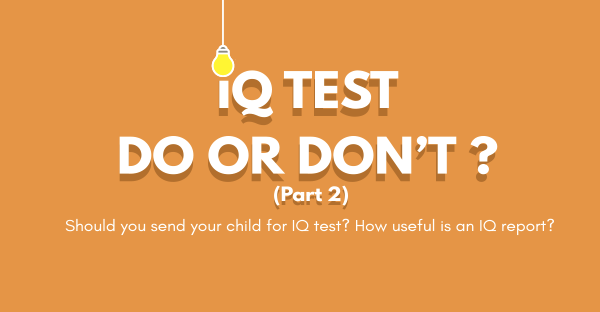
IQ Test, Do or Don't? (Part 2)
Should you send your child for an IQ test?
If you feel the need for another unbiased opinion regarding your child’s ability, you can opt to send him or her for a professional assessment. Or if you suspect your child has behavioural concerns or a learning problem, you should take him or her to see a qualified psychologist. Your child may be twice exceptional; gifted but has a learning issue with social development.
Before sending your child for testing, do keep the following pointers in mind:
- Make sure it is a registered clinical psychologist or educational psychologist that is administering the IQ evaluation.
- IQ tests together with their accompanying psychological reports are quite costly, around the range of $600 to $1,000 (Singapore dollars).
- IQ scores can change. The score you get at a certain point of time is just a `snapshot’ and moving target. Over time, if properly nurtured and with more exposure, IQ can grow by more than ten points!
- While a child as young as two years six months can be tested, the best gauge of IQ is between five and nine years of age. When the child is too young, he may not be cooperative and it may result in a higher error.
- As the tests are almost always conducted in English, your child will be disadvantaged if English is not his or her first language.
Can you prepare your child for an IQ test?
You cannot prepare your child in the sense of studying for a test or doing past year papers. You can, however, develop your child’s potential. Provide him with as many books as he asks for. Take him to the library. Send him to classes that will improve his visual-spatial reasoning and analytical skills. Remember, IQ is not static but fluid. Given proper nurturing and exposure, it is possible for a child’s IQ to grow by 10 to 20 points!
This possible rise in IQ is called the Flynn Effect and named after James Flynn, an intelligence researcher from New Zealand who discovered that there has been an increase in each successive generation’s average IQ test scores (Flynn, 1987).
Flynn’s research data was gathered from 20 countries including China, Britain and the United States. The results were consistent. IQ test scores were seen to increase over time in all countries without exception! There was an average 10 point increase with each subsequent generation. And this without any form of deliberate intervention.
So imagine the potential increase in IQ for your child if you began nurturing him from young.
How useful is an IQ report?
IQ tests can be useful for several reasons. Firstly, it can help you understand your child better. And if you understand your child better, you can make more focussed plans for her education so as to maximise her potential.
Secondly, if the report discovers or confirms some form of learning concern or special need, it gives you the opportunity to arrange for therapy and early intervention. The earlier the issue is discovered, the better the chance your child has to cope and overcome it.
A word of caution: Some parents think an IQ report is a `passport’ or a guaranteed entry to a gifted programme. No, it isn’t. Most international gifted education programmes run their own assessment tests (which cover more than pure IQ) rather than depend solely on IQ reports. IQ is not equal to how well your child will perform during the assessment test.
What other ways are there to spot giftedness?
While an IQ evaluation is useful in confirming giftedness, there are other ways to spot giftedness. At the end of the day, an IQ score is just a snapshot of your child’s intelligence at that particular point of time. It can be influenced by subjective factors like your child’s mood during the time of the test, the timing, the place and even his feelings towards the psychologist!
That’s why experts have determined that the most accurate method of spotting giftedness is this: Observation and Experience
Observation and Experience by educators
Traits of giftedness in a child are often noticed by teachers, especially those trained in gifted education. Many a parent has said that he was made aware of his child’s giftedness through the teachers of the preschool that his child attends.
The teachers will give feedback on how quickly the child finishes assignments and how they have to give more challenging work so the child doesn’t get bored or how the child is reading a few levels ahead of his classmates or maybe even how the child can seem disruptive but will have completely understood the lesson when questioned.
If you receive such feedback, it may be a sign that your child is gifted.
Observation and Experience by parents
It should come as no surprise because you (and also other caregivers) get to see and interact with your child day in day out, and are very likely to notice any unusual behaviour. In fact, according to Dr Linda Silverman, director of the Gifted Development Center in Colorado, 84% of 1000 children whose parents felt they exhibited three-quarters of the traits from the Characteristics of Giftedness Scale did actually turn out to be intellectually superior or gifted when tested (Silverman, 2012)!
What does this mean? If you suspect your child of being gifted because she has shown many of the traits from the list of characteristics that have been observed in gifted children, there is an 84% chance that she probably is!
In the next blog post, we will share about the myths, misconceptions and misunderstandings about gifted kids. Subscribe to our mailing list for more blogs about gifted education!
Learn more about our programmes here.
